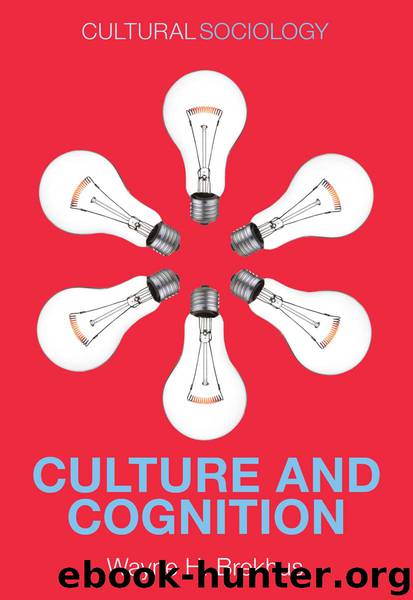Culture and Cognition by Wayne H. Brekhus

Author:Wayne H. Brekhus
Language: eng
Format: epub
ISBN: 9780745698229
Publisher: John Wiley & Sons, Inc.
Published: 2015-09-17T00:00:00+00:00
In this and comparable analogisms, Serbs compared the Croatia likely to emerge to a past Croatia governed by the proto-fascist Ustasa; similar corresponding analogisms comparing present-day Serbs with the Cetniks of the 1940s circulated among Croatians (Rydgren 2007: 235). Rydgren argues that the choice of the 1940s as a reference point was rooted in sociocognitive processes of meaning-making, categorization, attention, and memory. Pre-existing, systematized schemas of knowledge, he argues, shape not only the ways we categorize but also how we make inferences and draw analogies. Individuals are cognitive misers motivated to save time and cognitive energy, which leads them to use cognitive strategies without much reflection (automatic cognition rather than deliberate cognition) (Rydgren 2007: 228). Although this often works for us in everyday situations that are continuous and repetitive, Rydgren suggests that when we face new or black-box situations that we lack experience in handling, dubious knowledge structures including myth and rumor are more likely to be activated. This is also when we are likely to rely on the authority of those we most trust because they are in positions of authority or because they are in a similar social category of belonging to us (e.g. the same ethnicity) (Rydgren 2007).
Analogisms are often misleading because people tend to remember significant (culturally marked) events more than insignificant (culturally unmarked) ones. The effect of our selection bias is that we disproportionately notice and therefore remember and give greater analogical weight to dramatic events, while allowing common, mundane events to fade into the background or disappear. Routine events that are dull but representative of a certain period are easily ignored while dramatic but usually unrepresentative events are easily remembered (Rydgren 2007: 230). Elites often assist in directing our selection bias and tipping our analogies toward the dramatic in their speeches and propaganda to motivate supporters and action, and commemorations focusing on the most vivid, and therefore usually the most spectacular, events further socialize our cognitive attention to the extraordinary.
Rydgren argues that narrativization further orients our meaning-making, and the process of narrativization is heavily influenced by culture, especially cultural processes such as commemoration. Narrativization constructs an orderly, inevitable course of interconnected events out of what is initially a flow of relatively disorganized, unstructured events. Narrativization, Rydgren notes, leads to simplification as some events are amplified or magnified while others are disregarded as non-events. This often contributes to memory distortions and distinct cognitive biases (Rydgren 2007). Ultimately, he argues, these memory biases lead people to act on their fears and to mobilize or take pre-emptive action in ways that further conflict. They affect not only thought but action. Analogy, metaphor, and narrative work hand in hand to construct meaning and connections that shape both thought and action.
Abigail Brooks (2004) analyzes the way narratives and analogies around cosmetic surgery shaped its normalization. Two dominant narrative frames were used to discuss cosmetic surgery. One narrative frame focused on it as a new technology and the other centered on candid, first person accounts of it. Most, but not all, media coverage of cosmetic surgery fell into one of these two frames.
Download
This site does not store any files on its server. We only index and link to content provided by other sites. Please contact the content providers to delete copyright contents if any and email us, we'll remove relevant links or contents immediately.
| Anthropology | Archaeology |
| Philosophy | Politics & Government |
| Social Sciences | Sociology |
| Women's Studies |
Nudge - Improving Decisions about Health, Wealth, and Happiness by Thaler Sunstein(7684)
The Fire Next Time by James Baldwin(5417)
iGen by Jean M. Twenge(5399)
Adulting by Kelly Williams Brown(4556)
The Sports Rules Book by Human Kinetics(4372)
The Hacking of the American Mind by Robert H. Lustig(4356)
The Ethical Slut by Janet W. Hardy(4234)
Captivate by Vanessa Van Edwards(3831)
Mummy Knew by Lisa James(3671)
In a Sunburned Country by Bill Bryson(3526)
The Worm at the Core by Sheldon Solomon(3473)
Ants Among Elephants by Sujatha Gidla(3452)
The 48 laws of power by Robert Greene & Joost Elffers(3208)
Suicide: A Study in Sociology by Emile Durkheim(3003)
The Slow Fix: Solve Problems, Work Smarter, and Live Better In a World Addicted to Speed by Carl Honore(2993)
The Tipping Point by Malcolm Gladwell(2897)
Humans of New York by Brandon Stanton(2860)
Handbook of Forensic Sociology and Psychology by Stephen J. Morewitz & Mark L. Goldstein(2691)
The Happy Hooker by Xaviera Hollander(2681)
